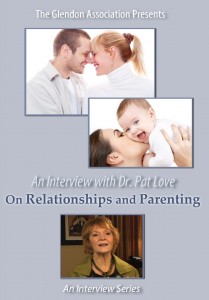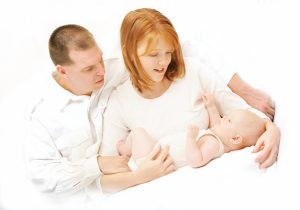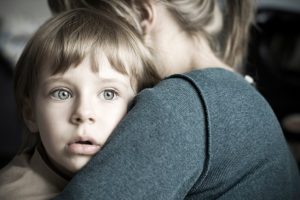Dr. Pat Love on Parenting

Dr. Pat Love on what it is to parent, and the mistaken conceptions of parenting that are endemic to our culture:
There’s a lot of talk today about parents who hover, these helicopter parents. And there’s just one line that I like to say and that is: When you do something for someone else, let’s say your child, that he can do for himself, you teach him that he’s inept and you teach him to be irresponsible. And also, it builds that sense of entitlement that is so strong in the Western world that somehow, “I’m entitled.” But, but I think also, there’s a point here that’s subtle but extremely important. And that is, basically I think the parental role is about providing love, protection and structure. And the structure means that, “I’m the adult. I have the means. I’m going to protect you and that I am going to provide boundaries for you. You know, while you’re developing, while your brain is developing and organizing, I’m going to be the neo-cortex. I’m going to be the person who sets limits. And these limits are designed to protect you.”
Meanwhile, within any family, there are at least three units. There’s the spousal unit or the executive unit. If it’s a single parent, that is an adult person getting their adult needs met from other adults. That’s the executive unit. Then there’s the parental unit, where you provide love protection and structure. And then there’s the sibling unit. Now these units are very distinct. And I think there’s an important point here. Children, when you give them privilege or when you over-function or when you treat them as a best friend, or a confidant, or a playmate, or a financial partner or you say to your child, “You’re somehow responsible for my emotional well being. Look what you did to me.” When I make my child responsible for my emotional well being, to me, that’s backwards parenting. And when you’re so involved with your child and you have your own ego involved with the child, that somehow their behavior is supposed to be designed to make you happy, then I say you’ve violated a protective boundary around the children. Because children, they’ll act like adults.
When you bring a child up into that executive unit and let them make decisions, let them run the family – because kids will do it. They’ll take that privilege. But when you take that child as a best friend, best friends don’t regulate each other’s behavior. You know, if you and I are best friends, we go to the movie, you know, we get pop corn, we get a Coke, we watch the movie, we have a good time, we come out and you’re going to go to your car, I’m going to go to my car and I say, “Now, when you get home, you get that room cleaned.” And you’re like, “What – where do you get off?” And parents who do that entitlement, who are over-involved because they need it, they don’t have a life, they don’t have support. And so often times, parents feel guilty because they’re pressed with time, they’ve got a long commute, they don’t have as much time at home and so what they do is then, they over-function and they feel so guilty that they don’t want to go out and be with their friends or take time, leisure time, adult time. And I’m saying that partnering, or enjoying yourself as an adult, is a primary part of parenting. Because if the child feels responsible for your happiness or your emotional well-being, they can’t be a child. They have to grow up. They act like adults and, by the way, adults like kids that act like adults. Kids don’t like kids that act like adults. And, the problem is, once they become teenagers and you try to set some limits, they’re like “Where do you get off …” It would be like, you know, “Friends don’t do that. You can’t set limits with me. I’ve been your best friend.” And, the parent is afraid to set the limits because they don’t want the child to be upset with them. And I’m telling you, if you’re doing parenting correctly, your child is going to be upset and how many times have you and I heard children, teenagers, even say, “I wish they had set limits. I wish they had set limits.” You know, it was in the New York Times this week an article, you know, one young man about his, about his Blackberry and his I-Ming and the Face-booking, he said, “I wish my parents would set the limits because I can’t do it.” We have to be the neo-cortex. We have to be the frontal lobe while this is developing in the adolescent and the child. That’s why parents, you know, that’s why you don’t create children until you’re of a certain age.
So I think it’s really important to have a distinction, to know that the executive unit – I need as a parent to be getting my adult needs met from other adults. Whether it’s friends, a partner, a love relationship. Parenting is simply about providing love, structure and protection. And you do get to set the rules. And at times you do get to say, “Because I said so and because I own the home. Because I make the money. Because I am the grown-up.” You can say that, you know, in a rush and then later you get to explain. And kids get to be kids and they get to grow up. And they get to have their own responsibilities. But the responsibility isn’t my emotional well-being or to make me happy or to take care of me.
Order a DVD of Dr. Pat Love’s full interview with PsychAlive, “On Relationships and Parenting“
 In this DVD, Dr. Pat Love covers a variety of topics regarding relationships and parenting. She begins by defining the concept of love and what it means to be loving. She discusses values in a loving relationship and offers tactile tips for couples on improving the quality of their relationships. Dr. Love also addresses the importance of equality in a relationship, sexuality, and what she has learned from her years as a couples’ therapist. Shifting her focus to parenting, Dr. Love offers her perspective on how to raise emotionally healthy children. “Parenting is simply about providing love, structure and protection,” she explains, emphasizing that it is important for parents to set limits for their children but not “hover” over them. This DVD is packed with useful information for introspective individuals and mental health professionals alike.
In this DVD, Dr. Pat Love covers a variety of topics regarding relationships and parenting. She begins by defining the concept of love and what it means to be loving. She discusses values in a loving relationship and offers tactile tips for couples on improving the quality of their relationships. Dr. Love also addresses the importance of equality in a relationship, sexuality, and what she has learned from her years as a couples’ therapist. Shifting her focus to parenting, Dr. Love offers her perspective on how to raise emotionally healthy children. “Parenting is simply about providing love, structure and protection,” she explains, emphasizing that it is important for parents to set limits for their children but not “hover” over them. This DVD is packed with useful information for introspective individuals and mental health professionals alike.









Leave a Reply